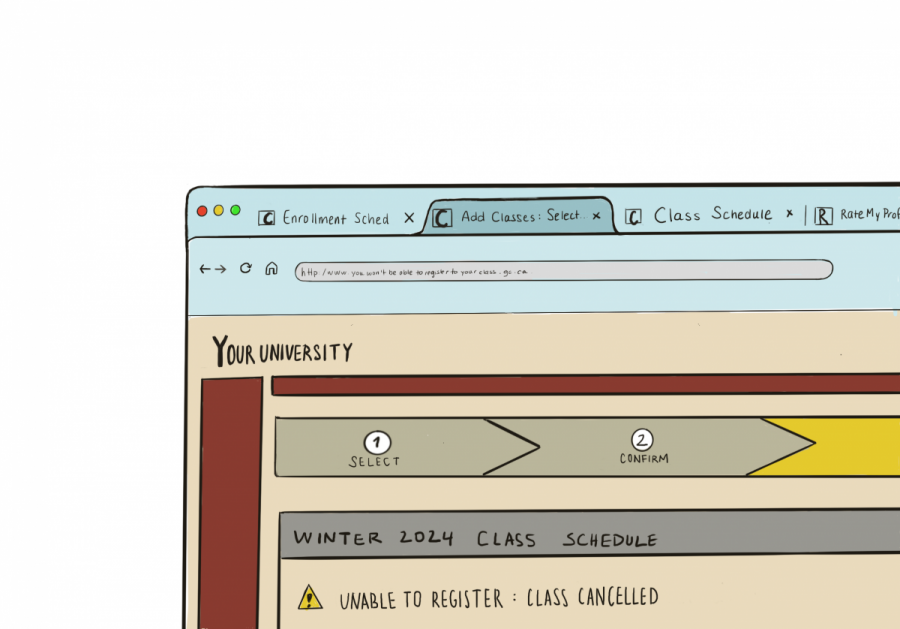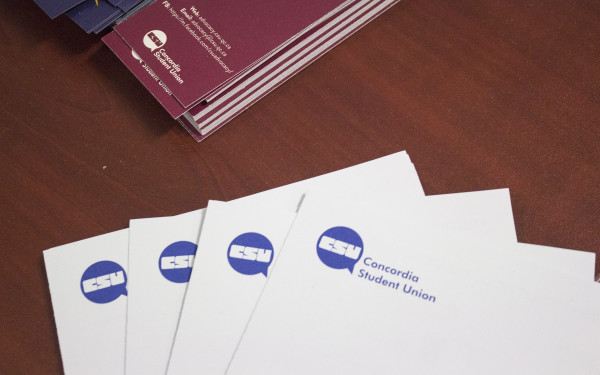Course cuts disrupt academic life
As Concordia struggles to balance the budget, students pay the price
Valérie Brunelle, a third-year psychology major, is one of the many Concordia students concerned about how courses being cut or cancelled will impact her academic career. Even before budget cuts at the university were announced, Brunelle said she was struggling to create a schedule that met her degree requirements.
“Last semester was a stressful shitshow,” said Brunelle. “The first week I was sitting on the edge of my seat hoping I would get into the classes because the waitlists were so long.”
Now, she is unable to plan the rest of her degree due to potential course cuts. Just last week, Brunelle said a professor announced that a course she had planned to take over the summer term had been cut, forcing her to reconfigure her schedule once again.
“For students who are graduating in the next few years, it’s going to be really stressful getting the classes they need to graduate,” she said.
Beyond academic requirements, Brunelle is also concerned about finishing her Ordre des psychologues du Québec (OPQ) training. In order to legally work as a psychotherapist in Quebec, the OPQ mandates 765 hours of specific training at a university level. This training works out to 42 credits-worth of university classes, as per Concordia’s course equivalency rubric.
With the prospect of fewer courses and fewer sections, Brunelle worries it will become harder and harder to complete her training.
Fears about course cutting started back in November 2023, when an internal memo was leaked to news outlets, revealing the extent of Concordia’s financial deficit. The memo reported that Concordia’s current deficit was $35 million, on top of the $362 million of total debt the university reported in 2023.
Along with inflation and rising interest rates, Concordia blamed lower enrolment for their loss of revenue. The memo reported that last year, enrolment decreased by 2.1 per cent and that the university could no longer meet core operating costs without cutting 7.8 per cent of the budget.
To help balance the budget, Concordia started to cut and cancel more courses than usual.
According to a faculty member, who wished to remain anonymous for safety reasons, the arts and science faculty was told in November that they would need to reduce the number of course sections by an average of ten per cent in the winter term.
According to Concordia spokesperson Vannina Maestracci, the main criteria for cutting a course is low enrolment. Enrolment requirements are determined by faculty and approved by the dean with input from the department chair.
“This is a process that happens every year and this year there was an additional responsibility to be rigorous in applying the enrolment limit, given the university’s financial situation,” Maestracci said.
“When a course ends up not being offered, students are offered alternatives: another section when that is available or other options of courses for which they can register,” she said..
A lack of coherent messaging from faculty and administration has left many students in the dark about how course cuts will impact them going forward.
Angelica Antonakopoulos, the academic coordinator for the Arts and Science Federation of Associations, said that the lack of transparency from the administration has made her job as a student organizer “impossible.”
“The administration as a whole has not been transparent with us,” said Antonakopoulos, “we are knocking on their door, they are not answering.”
According to Antonakopoulos, the issue of cutting courses was raised at the November and December meetings of the Arts and Science Faculty Council but tensions between administration and faculty remain unresolved.
Those might not be the only challenges for students. In 2023, Concordia brought in 37.3 per cent of its revenue through tuition fees. With the Coalition Avenir Québec’s proposed tuition hikes, the university has already seen 20 per cent fewer applications than in previous years. With Concordia’s debt and the provincial tuition hikes, students have begun mobilizing to have their voices heard.
This article originally appeared in Volume 44, Issue 9, published January 30, 2024.





_600_375_s_c1.png)
